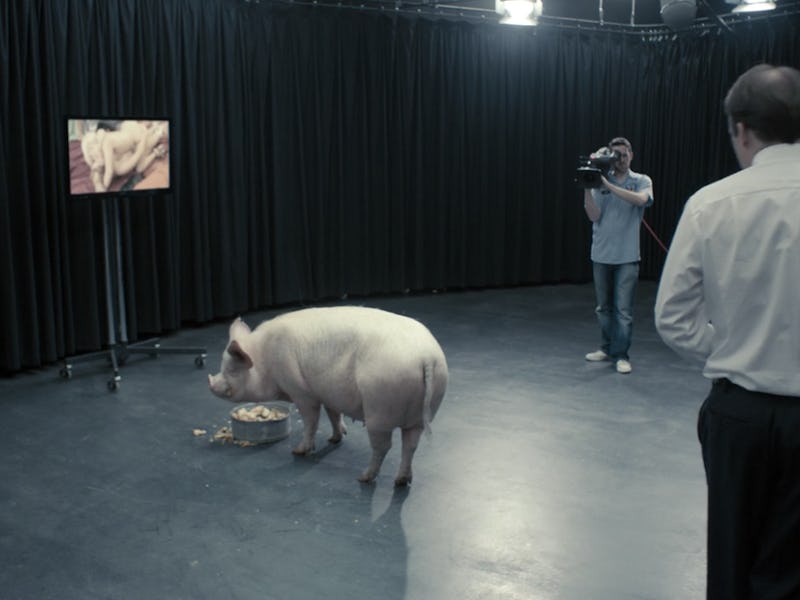The Best 'Black Mirror' Episode Isn’t Science Fiction At All
How "The National Anthem" makes us look into the mirror and be wary of what we see.

The best episodes of Black Mirror tell us something about how we live now, and perhaps its most memorable, “The National Anthem,” is so simply unnerving because it could literally happen right now.
The episode’s biting satire works so well because, while ridiculous, its premise is remarkably straightforward: A member of the royal family, a Kate Middleton proxy named Princess Susannah, is kidnapped and held hostage by a masked assailant who broadcasts their exploits via a YouTube video. Her safe release is guaranteed under one condition: Prime Minister Michael Callow (Rory Kinnear) must have sex with a pig on national television, and do it within a matter of hours.
Teetering ever so lightly around the edges of the darkest comedy imaginable, the episode is nevertheless anchored by the sobering reality that makes such a premise about the power of the internet so plausible. Much in the same way as, say, Jonathan Swift’s A Modest Proposal played intentionally coy by suggesting impoverished citizens of 18th century Irish society could ease their economic troubles by selling their children off as food for the British gentry, the situation in “The National Anthem” arises out of similar acerbic societal hyperbole.
News of terrorist plots has become a common occurrence in a post 9/11 world, with places like Britain becoming the most surveillance-heavy nation on the planet. The episode was able to stoke the nascent flames that brought about Brexit by suggesting that people at the upper echelons of society could be forced into some truly horrific things when it becomes personal, all exacerbated by a news media eager to sensationalize and already sensational story and a public willing to eat it up. Nevermind the fact actual Prime Minister David Cameron was involved in a pig-related scandal of his own in real life.
An anonymous terrorist hostage that’s a journalist or a soldier is one thing, a celebrity figure that also happens to be a member of the royal family is unfairly seen as somehow more important by all parties. The absurd tension builds from there.
The PM tries everything in his power to both find the kidnapper and figure a way out of his swine-related fate. A counter-terrorist cyber squad tries desperately to track down the IP address for the video while a preeminent special-effects artist, known for his work on “that HBO moon-Western thing,” is brought in to potentially replace the politician’s face with another “performer” should the act be forced to occur.
When a new YouTube video threat seemingly indicates the terrorists have cut off the Princess’s finger because of the stalling tactics, Callow is forced to, as the Queen tells him on a stern telephone call, “do everything in [his] power to get her back.” The weight of his own humiliation and character assassination is too inconsequential in the minds of the press and the public when compared to literal assassination.
When he actually goes through with it, initially, everybody can’t turn away. But, soon the media frenzy freak show gives way to a more solemn collective thought: This is actually happening. A random viewer tries to turn the broadcast off after an hour. “This is history,” a colleague says, but the reaction becomes even more unsmiling. They don’t realize it yet, but someone has managed to meticulously game the system set up to insure their safety. Who’s to say this couldn’t actually happen?
Piggy piggy.
To Brooker, the important point isn’t about us finding out who did it. It turns out it was a Turner-prize winning artist out to make a point of artistic expression before committing suicide, and that the severed finger belonged to him and not the Princess. What’s worse, she was released before the pig sex deadline but everybody was too busy watching the spectacle to notice. Instead, the real point is what happens because of it, which, in the best satirical moment of the entire episode, turns out to be nothing much at all.
In a sardonic coda, a year later, it’s business as usual. The artist is denounced, the PM has an approval rating three points higher than the previous year, and an estimated 1.3 billion people participated in the collective trauma. Somehow, the worst brings out the best, and there’s something tragically timeless about that.